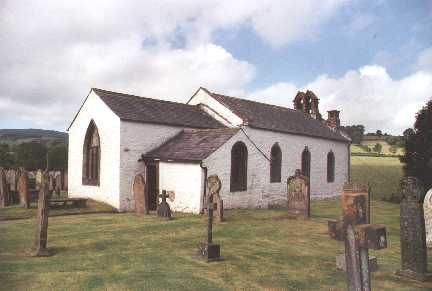Uldale village is situate 6 miles W. by S. of Hesket
Newmarket, 9 miles S. by W. of Wigton, and one mile S. by E. of Ireby. A sheep fair was
established here in 1791, and continues to be held annually on the 29th of
August; when from 500 to 1000 sheep are generally exposed for sale. The Church -
which stands about half-a-mile from the village, on the road to Ireby - is small, being
only 22 yards long and 8 broad. It was built, at the expense of the inhabitants, in 1730,
and is kept in good repair. The benefice is a rectory, in the patronage of Joseph
Gillbanks, Esq., who, in 1833, purchased the advowson of the Rev. John Cape, M.A., and who
has lately rebuilt the chancel (in which is a good stained glass window), and also added a
vestry to the edifice. The tithes were commuted in 1839 for a yearly rent charge of £130,
exclusive of surplice fees and Easter dues; and the glebe land is 22A. 1R. In 1835 it was
returned as of the net annual value of £151. The Rev. Joshua Clark is the present
incumbent.
1791, and continues to be held annually on the 29th of
August; when from 500 to 1000 sheep are generally exposed for sale. The Church -
which stands about half-a-mile from the village, on the road to Ireby - is small, being
only 22 yards long and 8 broad. It was built, at the expense of the inhabitants, in 1730,
and is kept in good repair. The benefice is a rectory, in the patronage of Joseph
Gillbanks, Esq., who, in 1833, purchased the advowson of the Rev. John Cape, M.A., and who
has lately rebuilt the chancel (in which is a good stained glass window), and also added a
vestry to the edifice. The tithes were commuted in 1839 for a yearly rent charge of £130,
exclusive of surplice fees and Easter dues; and the glebe land is 22A. 1R. In 1835 it was
returned as of the net annual value of £151. The Rev. Joshua Clark is the present
incumbent.
The Grammar School, at Uldale, was founded in 1726, by one Matthew Caldbeck, of Ruthwaite, who bequeathed to it £100; and another £100 was raised by subscription amongst the rest of the parishioners. Both these sums were laid out in the purchase of freehold land, which is now let for about £25 a year. Thomas Thomlinson, who died in North Carolina, in 1802, bequeathed the residue of his property (not otherwise disposed of) to the schools of Bromfield, Thursby, Wigton, and Uldale, the share allotted to the latter being £350, for which the master receives about £10 yearly interest; making the endowment £35 per annum. With a view to increase its general utility, a change has lately been made in the constitution of this school, by which nearly all the children are required to pay a certain quarterage. The master is chosen by seven trustees, of whom the rector is always to be one; Mr. Charles Creighton is the present master. The other charities belonging to the poor of the parish are - £4 4s., left in 1719, by John Dalston; £8 14s., as the interest of £200, bequeathed in 1771 by Thomas Cape; £2 8s., bequeathed by the above named Thomas Thomlinson in 1798; and a free quit rent of 4s. 6d. a year, recently purchased with £5 left by a Mr. Cowx.
The manor was first granted out of the barony of Allerdale by Waldeof, the son of earl Gospatrick, to Adam, a descendant of Lyolf, baron of Greystoke, from whom it passed to the Bonekills; whose heiress carried it in marriage to David Bregham, who forfeited it to Anthony, lord Lucy, by joining the Scotch patriotic army, commanded by Sir William Wallace7 - who was no less extraordinary for his strength and valour than his companion (Bregham) was for his horsemanship; - "whereupon," says Mr. Denton, "the Scotts thus rhymed on them :-
"The man was ne'er so wight or geud,
But worthy Wallace durst him byde;
Nor never horse so wild or weud,
But David Bregham durst him ryde."
Aukertree8 is one mile N. by E.; Longlands, one mile E. by S.; and Orthwaite, two miles S. of Uldale village.
Mannix & Whellan, History, Gazetteer and Directory of Cumberland, 1847